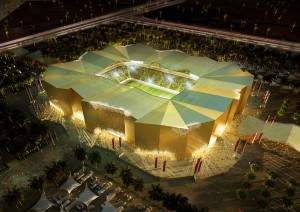By Kevin Baxter, Industry Editor at MEED www.ameinfo.com
The pace of Qatar’s economic development will depend on whether the country retains the right to host the 2022 Fifa World Cup following allegations of bribery.

Qatar’s economy is forecast to expand by more than 20% in 2011 – the fastest rate in the world – as the country reaps the benefit of its massive investment in liquefied natural gas (LNG) production.
In 2010, the last of Doha’s planned gas liquefaction trains came on stream, taking production capacity to 77 million tonnes a year and further cementing the Gulf state as the world’s largest exporter of LNG. Doha will enjoy its first full revenues of its targeted output this year, but thereafter economic growth will slow.
Qatar’s infrastructure spending
With no new major gas projects in the pipeline, Qatar’s hydrocarbons gross domestic product (GDP) is expected to stagnate from 2012 and remain flat until 2016. It marks the end of two decades-worth of hydrocarbons-fuelled rapid economic expansion.
Infrastructure spending will instead dominate the agenda over the next five years and around $65bn is due to be invested in a series of transportation schemes. Plans include the new $11bn new Doha International airport, the $6bn Doha port project, as well as a $25bn railway and metro.
Qatar has gained a reputation in recent years of struggling to execute infrastructure projects and several megaprojects have languished on the drawing board. But the country’s successful bid in December to host the 2022 Fifa World Cup has given a new sense of determination.
With a finite timeline, Qatar needs to deliver and firms are now eyeing the country in anticipation of a new construction boom.
Those plans were thrown into disarray in May, however, when it was announced that an investigation would be held into allegations that Qatar bribed representatives of Fifa, football’s governing body, to vote for its bid. If the accusations are upheld then a re-vote could take place, which could see Qatar lose the event. Doha’s ambitious infrastructure investment plans will be funded by hydrocarbons income, the mainstay of the country’s economy.
Proven gas reserves account for 78% of export income
Qatar has proven gas reserves of around 25 trillion cubic metres, which is about 14% of the world’s total and places it third in the world behind Russia and Iran.
The country also has proven oil reserves of 15 billion barrels, meaning output of 800,000 barrels a day (b/d) can be sustained for the next 37 years. Revenue from hydrocarbon exports amounted to $27.3bn in the 2010/11 fiscal year, around 78% of the total income from exports.
With growth in hydrocarbon revenues set to tail off, Doha is planning for non-hydrocarbon sectors to drive economic expansion in future. Sectors including transport and communications, along with business and financial services, are forecast to expand strongly, fuelled by World Cup-related investment activity. Population growth will also contribute. The government expects Qatar’s population to rise by 2.1% a year over the next five years, reaching 1.9 million in 2016.
GDP growth is forecast to be about 5%-6% a year in 2012-16, much lower than this year’s record-breaking figure, but still a healthy rate of increase.
“Qatar is one of the most stable countries in the Middle East and although its growth is not going to be as spectacular over the next five years as it was over the last five, it will still be around the 6% mark,” says Julie Beatty, principal economist at UK-based energy consultancy Wood McKenzie. “This kind of growth is more of a normal level and suggests that Qatar’s economy is becoming more developed than in previous years.”
Despite efforts to diversify the economy, Qatar will inevitably remain dependent on oil and gas sales for many years to come. And although investment in new LNG production capacity has for now come to an end, this could change when a decision is made in 2014-15 regarding the moratorium on exploration in the North Field, the world’s largest non-associated gas reservoir. A decision to restart exploration operations could see another surge in hydrocarbons GDP growth.
The pace and strength of Qatar’s future economic development will depend, in large part, on whether the country retains the right to host the World Cup.
There is much more at stake for Doha than simply staging an event; there is an immovable deadline by which Qatar must build all the infrastructure committed to in the bid documents. Doha has a grand vision and has the money to execute the vision. But the danger is that if it loses the World Cup, it will also lose the will to execute the vision. The 11-year construction boom and many of the infrastructure projects would likely fail to materialise, dampening prospects for economic growth.
















